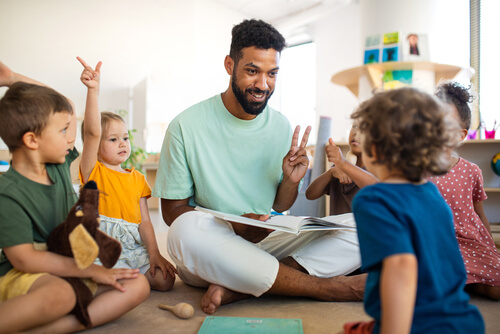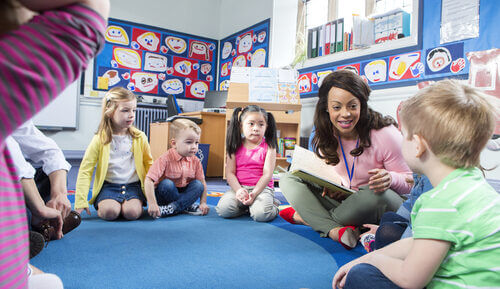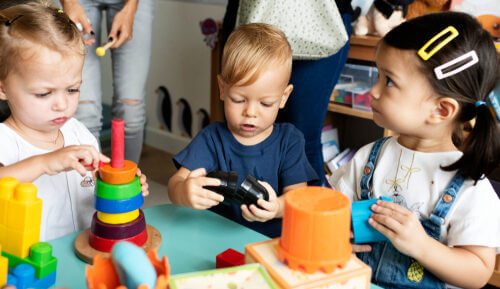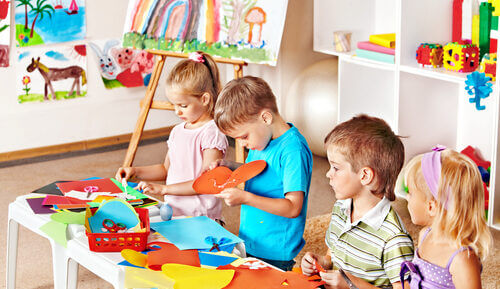
Table of contents
As of September 2022, early years settings will use the new Curriculum for Wales alongside the existing Welsh Foundation Phase Framework. This new curriculum gives guidance on learning for children in Wales aged 3 -16, though this article will focus on how it applies to nursery and preschool children.
The key differences between the existing framework and the new curriculum are:
- New purposes of the new curriculum.
- Subjects (from the old school curriculum) have been replaced with six Areas of Learning.
- Practitioners have more flexibility to be creative in their teaching.
- Stages have been removed in favour of a seamless curriculum.
The new curriculum was developed by education practitioners in Wales but draws on wisdom and practices from around the world.
It was established by law in the Curriculum and Assessment (Wales) Act 2021. In early years, it is intended for use by funded non-maintained nurseries in Wales. Nurseries can design their own curriculum as long as it meets requirements set out in the Curriculum and Assessment (Wales) Act 2021.
The 4 purposes of the new Curriculum for Wales
The new Curriculum for Wales outlines its ‘four purposes’, these being four traits that education in Wales should instil in its learners. These are what they hope every young learner in Wales will become:
1. Ambitious and capable learners who are ready to learn throughout their lives.
They are enthusiastic learners and problem-solvers who enjoy a challenge and can communicate effectively in English and Welsh.
2. Enterprising and creative contributors who are ready to play a full part in life and work.
They can use their knowledge and skills to create new ideas, think of creative ways to solve problems and take measured risks. They can work as a responsible member of a team.
3. Ethical and informed citizens who are ready to be citizens of Wales and the world.
They can find and analyse evidence, engage with contemporary issues, understand their rights as well as the impact of their choices on others, and respect others’ viewpoints and beliefs.
4. Healthy and confident individuals who are ready to lead fulfilling lives as valued members of society.
They live healthy lifestyles and are actively developing their independence, resilience, empathy, self-confidence and values.
Of course, these purposes are what the Curriculum aims to support every child and young person to become by the time they conclude their education, but the early years build a strong foundation in achieving this.
The 5 developmental pathways of the new Curriculum for Wales
In early years in Wales, children’s education particularly focuses on five developmental pathways. These are:
Belonging
It’s important that children can recognise their own unique needs, likes, dislikes and values, those of others, and how everybody plays a part in the wider community.
Communication
Children develop their communication skills in order to express their own needs, wishes and opinions. They learn to recognise and understand the needs, wishes and opinions of others and develop social relationships with practitioners and each other.
Exploration
Children explore their own interests and fascinations, with support and encouragement from practitioners. They learn to investigate and experiment to discover new things and how things work. They can communicate effectively in order to share their interests with others.
Physical development
Children develop their motor skills, co-ordination and balance through a wide range of physical activities and challenges.
Well-being
Children recognise and value emotions, interests, qualities and choices in themselves and in others. They learn independence and resilience and respect others’ autonomy.
The 6 Areas of Learning of the new Curriculum for Wales
Rather than a list of subjects that must be covered (though this is less applicable to early years settings than schools anyway), the new curriculum offers six Areas of Learning.
Area One – Expressive arts
This Area includes art, music, dance, film and digital media, and drama.
Through these, children learn:
- To work together and to value and complement each other’s contributions in creating.
- To explore and express their emotions in creative ways.
- How to look at others’ art and think about what they are communicating through it.
- Time-management and resourcefulness.
Area Two – Health and well-being
This Area builds children’s understanding of the value of physical, mental, social and emotional health, and teaches them how to look after their health and well-being.
Children learn:
- How to look after their physical health and why it matters. In early years this includes plenty of opportunity for physical movement in order to develop children’s awareness of their bodies, strength, co-ordination and balance.
- To recognise and respond to emotions in themselves and others.
- How to consider the impact of their decisions on others.
- How to build and maintain healthy relationships.
Area Three – Humanities
Humanities in early years may include history, geography, religion, ethics and social studies, though practitioners may introduce other humanities topics where appropriate.
The aim of this Area is to support children to become informed and ethical citizens. They will learn:
- About the history and contemporary practices of Welsh culture and other cultures.
- About religious and non-religious beliefs and practices.
- To explore their own values, ethics and beliefs, and to listen to those of others.
- Curiosity about the natural world, human society and history.
Area Four – Languages, literacy and communication
In this Area, children learn to communicate effectively in English (though providers can choose not to include English in order to support development of fluency in Welsh language), Welsh and other languages where applicable.
They will practise:
- Speaking, listening and communication, learned through real-life experiences. Children learn vocabulary and grammar by using it to explain what they mean effectively.
- Using skills learned in one language (Welsh or English) and applying it to the other.
- Mark-making and some writing, such as individual letters and numbers.
- How to use language to express feelings, wants and opinions, and to learn about those of others.
- How stories, songs, poems and rhymes inspire imagination and creativity.
Area Five – Mathematics and numeracy
Children will learn early maths skills and how they can be used to solve problems in day-to-day life. Nurseries use practical experiences to enable children to learn mathematical skills and apply their knowledge in practice.
Skills they will cover include:
- Numbers and counting.
- How adding and taking away objects affects how many there are in total.
- Identifying and drawing shapes and patterns.
Area Six – Science and technology
Children learn how science and technology underpin the workings of the world we live in. This subject is, of course, vast, but children in early years may explore:
- Using various materials to experiment with forces and motions such as push or pull, hard or soft, sink or float, light or heavy.
- Learning about parts of the body, senses, animals, plants and weather.
- Learning to compare, sort and classify objects and other things, such as places, the weather, feelings etc.
- Using digital technology, such as electric toys, household objects, tablets and computers, etc.
Emphasis on progression
Throughout the six Areas of Learning are the ‘27 mandatory statements’.
These statements state what it means for learning in this Area to be progressive. What it means is, in short, to steadily acquire knowledge and develop skills over time.
The principles of progression detailed in the Curriculum and Assessment (Wales) Act 2021 are:
- Increasing effectiveness
- Increasing breadth and depth of knowledge
- Deepening understanding of the ideas and disciplines within the Areas.
- Refinement and growing sophistication in the use and application of skills.
- Making connections and transferring learning into new contexts.
There are five progression steps. Children aged 3-5 are Progression Step 1.
Practitioners can be creative with learning experiences
Under the new Curriculum for Wales, practitioners do not have a set timetable of activities they must provide. Instead they focus on meaningful learning, activities that provide significant learning opportunities.
Early years settings can be innovative in play and learning resources. Some provide toys and games for children, others prefer natural materials and others offer household objects for children to play with. Play is always at the heart of early years learning.
Nurseries also make the most of their settings, including indoor and outdoor spaces and local amenities as further educational opportunities. Practitioners are encouraged to create multi-sensory learning environments that are emotionally comforting, rich in opportunities for problem-solving and communication, and incite physical movement.
Practitioners are observant and interested in each child’s development journey and their unique interests and fascinations. They use these observations to plan activities and learning experiences that support every child’s needs and help them to achieve their learning and development goals.




